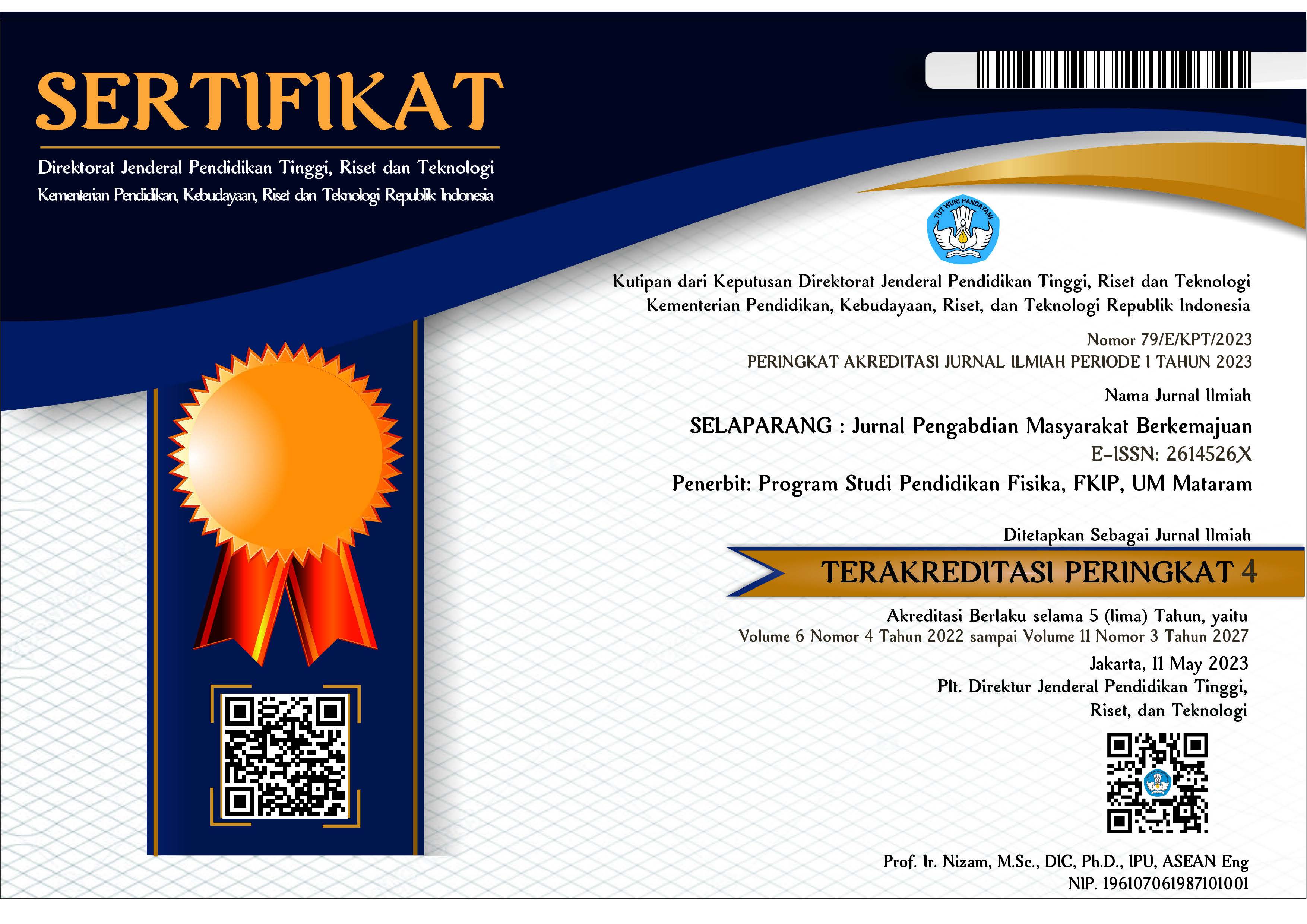Pelatihan management by exception untuk peningkatan kapasitas manajerial pengobat tradisional
Abstract
Abstrak
Pengobatan tradisional telah berkembang pesat sebagai alternatif pengobatan modern, sehingga memerlukan peningkataan kemampuan pengelolaannya secara modern. Kapabilitas manajerial yang profesional menjadi hal yang penting bagi para pengobat tradisional untuk meningkatkan proses manajerial yang berkemajuan. Kegiatan pengabdian ini bertujuan untuk membekali para pengobat tradisional tentang implementasi management by exception sebagai upaya untuk peningkatan kapasitas manajerial. Management by exception merupakan metode manajerial yang berfokus pada hal-hal yang tidak sesuai dengan standar yang telah ditetapkan. Implementasi management by exception dapat meningkatkan kapabilitas pengobat tradisional untuk pengelolaan entitas bisnis secara profesional sehingga meningkatkan laba organisasi. Metode pelaksanaan pengabdian menggunakan pendekatan hands on training untuk memastikan para peserta dapat secara aktif mempelajari dan menerapkan konsep manajerial berbasis penyimpangan. Mitra kegiatan pengabdian adalah para pengobat tradisional yang berfokus pada pengobatan alternatif. Hasilnya, berdasarkan data post test, menunjukan bahwa para peserta mampu memahami dan menerapkan pendekatan manajerial management by exception dengan baik.
Kata kunci: pelatihan; pengobatan tradisional; kapasitas manajerial; management by exception
Abstract
Traditional medicine has evolved significantly into modern alternative medicine, necessitating enhanced managerial capabilities to support this transformation. Strenghtening professional management skills is essential for traditional healers to improve their operational and strategic processes. This community service initiative aims to equip traditional healers with knowledge and practical skills in management by exception (MBE) as a means to enhance their managerial competence. MBE is a managerial approach that emphasizes addresing activities that deviate from predefined standards. The implementation of management by exception can strenghten the capabilities of traditional healers to manage their business entities professionally, thereby improving organizational efficiency and profitability. The program adopts a hands-on, enabling participants to actively engage with and apply the principles of deviations-focused management. The partners involved in this community service activity are traditional healers specializing in alternative medicine. Post-test data indicate that participants successfully understood and applied the MBE approach in their managerial practices.
Keywords: training; traditional medicine; managerial capacity; management by exception
Keywords
Full Text:
PDFReferences
Abdulrahman, M. K., & Nouri, N. R. (2023). The role of management by exception in crisis management: An exploratory study in technical education organizations. Tikrit Journal of Administrative and Economic Sciences, 19(61), 284–310. https://doi.org/10.25130/tjaes.19.61.2.16
Al-Dirduri, A. I. M. (2017). The role of management by exception in achieving entrepreneurial leadership. Journal of Economics, Administrative and Legal Sciences, 1(8), 101–117.
Alshiqi Bekteshi, S. Z. (2019). The impact of education and training on export performance of SMEs. International Journal of Research in Business and Social Science, 8(6), 272–277. https://doi.org/10.20525/ijrbs.v8i6.565
Atiase, V., Wang, Y., & Mahmood, S. (2023). Does managerial training increase SME managers’ effectiveness? A capability development approach. International Journal of Entrepreneurial Behavior & Research. https://doi.org/10.1108/IJEBR-05-2022-0405
Campos, F., Frese, M., Goldstein, M., Iacovone, L., Johnson, H., McKenzie, D., & Mensmann, M. (2017). Teaching personal initiative beats traditional training in boosting small business in West Africa. Science, 357(6357), 1287–1290. https://doi.org/10.1126/science.aan5329
Cui, F., Lim, H., & Song, J. (2022). The influence of leadership style in China’s SMEs on innovation performance: The mediating role of organizational learning. Sustainability, 14(6), 3249. https://doi.org/10.3390/su14063249
Dammert, A. C., & Nansamba, A. (2023). Skills training and business outcomes: Experimental evidence from Liberia. World Development, 163, 106117. https://doi.org/10.1016/j.worlddev.2022.106117
Forkuoh, S., Li, Y., Ampadu, M., & Osei, M. (2016). Institutional support in managerial capacity building and SMEs growth. Open Journal of Business and Management, 4(2), 188–205. https://doi.org/10.4236/ojbm.2016.42021
Haidoura, H. M. (2020). The impact of training and development programs on employees’ performance: The case of Lebanese SMEs. International Journal of Economics, Business and Management Studies, 7(1), 190–201.
Idris, B., Saridakis, G., Georgellis, Y., Lai, Y., & Johnstone, S. (2023). Exporting is a team sport: The link between management training and performance in SMEs. International Journal of Manpower, 45(5), 1019–1036. https://doi.org/10.1108/IJM-03-2023-0150
Langton, I., & Mafini, C. (2022). Transactional leadership and its effect on supply chain management in manufacturing SMEs. EUREKA: Social and Humanities, 5, 10–30. https://doi.org/10.21303/2504-5571.2022.002479
Musyimi, C. W., Mutiso, V. N., Ndetei, D. M., & Henderson, D. C. (2017). Formative research on integrating traditional healers into mental health care in Kenya. Global Social Welfare, 4(4), 229–238.
Pauli, U. (2020). Training professionalisation and SME performance. Human Resource Development International, 23(2), 168–187. https://doi.org/10.1080/13678868.2019.1696288
Valero, M., Jung, A., & Zúñiga-Collazos, A. (2021). How does leadership impact SME performance? A systematic review of a decade. Journal of Small Business Management, 59(S1), 179–197. https://doi.org/10.1080/00472778.2021.1938091
Van Rooyen, D., Pretorius, B., Tembani, N. M., & Ten Ham, W. (2015). Allopathic and traditional health practitioners’ collaboration. Curationis, 38(2), 1–10. https://doi.org/10.4102/curationis.v38i2.1495
Willis, S., Clarke, S., & O’Connor, E. (2017). Contextualizing leadership: Transformational leadership and Management-By-Exception-Active in safety-critical contexts. Journal of Occupational and Organizational Psychology, 90(3). https://doi.org/10.1111/joop.12172
DOI: https://doi.org/10.31764/jpmb.v9i1.32132
Refbacks
- There are currently no refbacks.

This work is licensed under a Creative Commons Attribution-ShareAlike 4.0 International License.
______________________________________________________
Jurnal Selaparang
p-ISSN 2614-5251 || e-ISSN 2614-526X
EDITORIAL OFFICE:



















